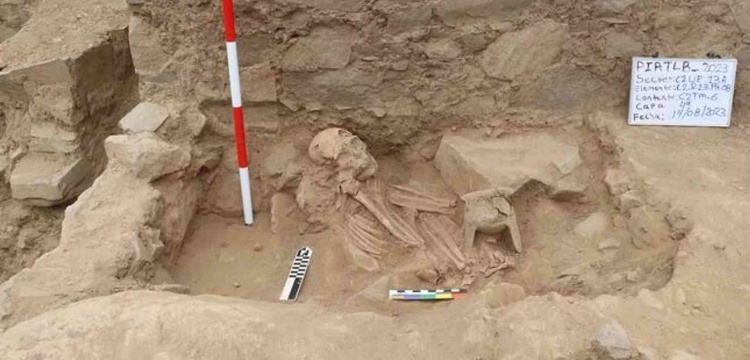Archaeologists in Peru have found an pre-Hispanic settlement where various ethnic groups lived together

An Archaeology team of Peruvian and Japanese archaeologists has unearthed a pre-Hispanic archaeological site where various ethnic groups lived together in northern Peru dedicated to ancestor worship, with burial chambers, human remains and ceramic offerings. The discovery was made by the Project of Archaeological Investigation (PIA) Terlen-La Bomba and it occupies about 24 hectares (60 acres).
Archaeologists conducting excavations in Peru have found an extensive pre-Hispanic settlement where various ethnic groups lived together. Archeologists explained that the findings are of a great value since there is little evidence of the Wari culture, a pre-Inca Indian culture that existed on the south-central coast of present-day Peru. The Wari culture remained between the 7th and 13th centuries in what is now Peru, but by 1100 AD the Wari were conquered by the burgeoning Inca Empire.
The settlement, discovered in northern Peru’s Cajamarca region, belongs to the Wari culture and dates back to the 7th to 13th centuries BC.
In a statement, the Project of Archaeological Investigation (PIA) said the discovery, which occupies 24 hectares (60 acres), included two burial chambers with an elaborate underground construction.
Shinya Watanabe, one of the directors of the project, said in a statement that the archaeological excavations found shattered pottery, vessels, various weapons and traces reflecting different traditions. Also found were a bundle of a female personage, a black Wari ceremonial vessel, two wind musical instruments made of ceramic, and two copper fasteners.
Judith Padilla, cultural director of the Cajamarca Centre, said they have made significant progress towards understanding Peru's past.
“In order to understand current practices, it is necessary to investigate the lifestyle and rituals of ancient societies living on Peruvian soil. We want to unravel the sociopolitical system of Cajamarca culture and its relationship with the Wari Empire," Padilla said.
Diğer English News Haberleri

Archaeologist Assoc. Prof. Dr. Erhan Bıçakçı passed away

